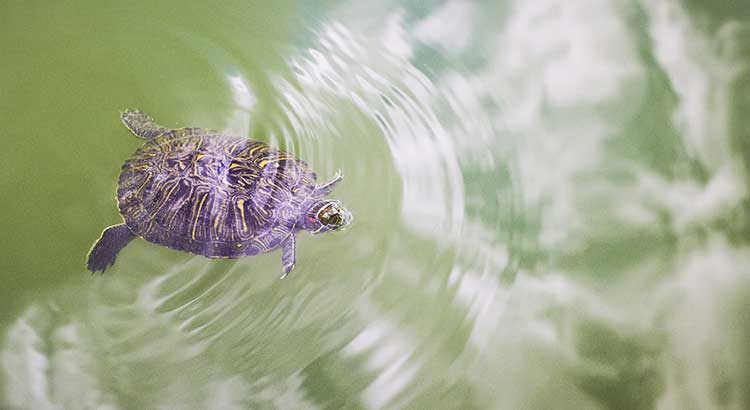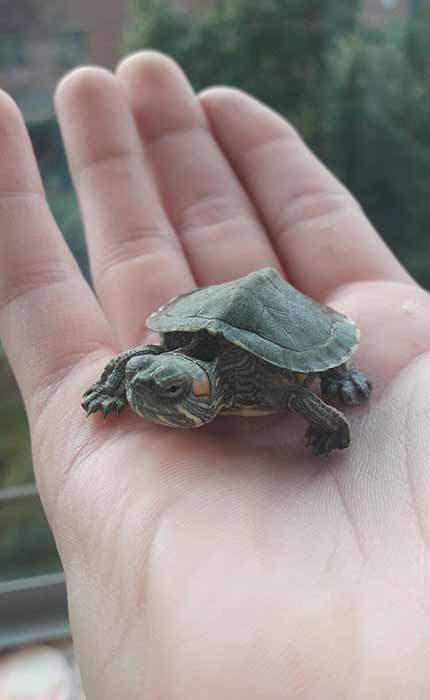Turtles spend most of their time in the water, so it’s important to make sure that your turtle won’t have to live in harmful water. But what is harmful water? Is tap water safe? And is it ok to use substances that kill the bacteria in the water?
Can turtles live in tap water? Turtles can live in tap water, but if the tap water has a high level of chlorine it won’t be good for the turtle’s health.
As you can see this is not a simple straightforward answer. So let’s dive a little deeper into the subject.
Tap Water
So let’s start with tap water. Tap water is not necessarily a type of water, it’s the water that comes out of your sink. But where that water originates and how it’s treated can differ greatly from region to region. So the answer to the question: can turtles live in tap water? Can be yes for one person and no for another person. The only certain way to know for sure is to test it, and fortunately, there are a few ways to do this, and one of them is completely free.
Most countries in the world have a specific agency that tests and provides information on the water in multiple areas. So you can google the agency in your country that does this and you should be able to find some information about the water in your area. The problem with this is that they usually choose an area and test it there, but there can be big differences between the water in the testing point and the water that reaches your home. It’s even possible that your house has a rusted pipe which can make your water different from the water your neighbor receives. So while this is a good way to get a general idea about your water, it’s not the most precise.
Another way to test your water is to buy a water testing kit. They are quite cheap and they are really easy to use. Here is a link to a testing kit that I’ve used before: API MASTER TEST KITS for Freshwater, Saltwater, Reef Aquariums, and Pond.
The final and most professional way of doing it is to take a sample of your water and take it to a water testing lab. In this case, I can’t make any recommendations since I never used this kind of testing method.
The surprising thing when it comes to turtles and water is that they are not very sensitive, but they still require quite a specific level of ph and chlorine levels. To find out why that is we have to look at the water in their natural habitat.
Water in the Natural Habitat
Turtles live in a lot of habitats, but overall most of them live in lakes and ponds. And in those places, the water is kind of dirty.
Most animals that live in those areas, urinate, defecate, and eat in that water, just to name a few things that happen in that water. And nobody comes to change it. So how can turtles live in that water, but they can’t live in bad tap water.
The answer is quite simple. Turtles are used to that kind of a mess, and the lakes are usually full of plants and bacterias that clean the water. And the water doesn’t have any kind of chemicals like chlorine. And the ph level is mostly the same.
So while we might consider the water there dirty, turtles will simply call it normal.
This is why we usually have to eliminate the harmful chemicals in the water to make it ok for turtles. And the way we make the water ok for turtles is by using multiple substances. But we also have to be careful with those substances.
Substances Can Help and Harm at the Same Time
The way in which we can make tap water good for turtles is by eliminating the chemicals from it, and how can we do this? By adding more chemicals.
While this might sound strange, this is the proper way to do it. Some chemicals are completely harmless to turtles, and they can make the bad chemicals go away. In a way chemicals are just like bacterias, some bacterias are good and we can’t live without them, while other bacterias are bad and they make us sick.
And speaking of bacterias, you have to be careful about how much of those substances you use. If you put too much of them you run the risk of getting rid of the good bacterias that get rid of the bad ones. And this can be very dangerous for your turtle.
Now that we’ve covered all those things, let’s speak about what kind of water turtles actually require.
What Kind of Water Turtles Require
The first thing that you should know is that every turtle species will have different requirements. The ones that I am going to give you are good for most species, but if you have a slightly more exotic species you might want to do some research for that specific species.
So here are the water levels that you should aim for:
- A pH between 6.0 and 8
- A chlorine level of 0
- An ammonia level of 0
- A nitrite level of 0.5 ppm (parts per million) or less (preferably zero)
- A nitrate level of 40 ppm or less
Another good and simple way to get more exact levels for your turtle is to ask at the pet shop where you bought it. But the values mentioned above should work for 90% of pet turtles.
Conclusion
So the answer to the question is more of a yes, but in the right conditions. In any case, turtles are known for being very resistant animals. So they won’t be too bothered by a small difference, in reality, they might not even feel it.
But if you want to offer your turtle the best possible environment you might want to test your water and adjust it as it’s needed.
I hope you’ve found this article useful. If you have any questions you can always leave them in the comment section and I will do my best to answer it as soon as possible.


